|
|
|
Sort Order |
|
|
|
Items / Page
|
|
|
|
|
|
|
| Srl | Item |
| 1 |
ID:
170478
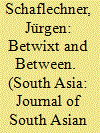

|
|
|
|
|
| Summary/Abstract |
The following article introduces Pakistan’s Hindu community and shows how the group represents itself through and within the country’s public spheres. In a first step, the paper reveals the ways in which Hinduism and its followers are portrayed in government schoolbooks, Urdu pulp fiction and religious literature. Through such media, the category ‘Pakistani Hindu’ emerges as caught between religious and nationalist discourses. In a second step, the paper analyses the Pakistani Hindus’ ways of becoming public within such an environment. Utilising Michael Warner’s work on public spheres, I will suggest calling Hindu engagement with the public in Pakistan ‘wary and aware’ performances.
|
|
|
|
|
|
|
|
|
|
|
|
|
|
|
|
| 2 |
ID:
170477
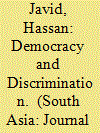

|
|
|
|
|
| Summary/Abstract |
Drawing on fieldwork conducted in Indian and Pakistani Punjab, this paper focuses on how, despite membership in or conversion to majority religious communities, former untouchables in both countries continue to experience caste-based discrimination. In India, a rights-based idiom for caste politics is limited by fragmentation within the Dalit community and the compromises required by electoral politics, while the imposition of a totalising Islamic identity by the state has resulted in the erasure of caste from the political discourse in Pakistan. This paper suggests that class-based mobilisation may be a better route to Dalit empowerment on both sides of the border.
|
|
|
|
|
|
|
|
|
|
|
|
|
|
|
|
| 3 |
ID:
170470
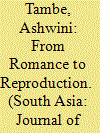

|
|
|
|
|
| Summary/Abstract |
This essay takes up for analysis how couples were represented in the cover art of the Marathi women’s magazine, Stree, from 1935 to 1965. Stree was the longest continuously running women’s magazine in Marathi (published from 1930 to 1986) and had a strong visual identity that benefited from cover images painted by noted artists. I focus here on a contrast that is evident between how couples were represented before and after Independence. Between 1935 and 1947, the hallmark image on the covers was the romantic couple, with alluring women as central figures. After Independence, between 1947 and 1965, the romantic couple receded from view and was replaced by scenes of comfortable and responsible mothering and domesticity. Depictions of premarital romance dropped, and women became components in a household tableau rather than the focus of romantic pursuit. In contrast with the Anglicised notions of glamour used in the 1930s, we also find a more explicitly Hindu aesthetic in the frequent representations of religious rituals and weddings. I treat these changing themes as an expression of the visual idiom of nation-building in mid twentieth century India. The increasing Hinduisation of couples in Stree covers reflects a post-Partition ethos of channelling conjugality along specifically majoritarian religious lines. The shunning of frivolity and the turn towards family and nation-building in this cultural text illustrates, in effect, how nationalism can shore up and promote very segregated gender relations.
|
|
|
|
|
|
|
|
|
|
|
|
|
|
|
|
| 4 |
ID:
170476
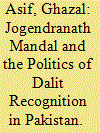

|
|
|
|
|
| Summary/Abstract |
This essay examines some turns in the Pakistani political career of the Dalit leader Jogendranath Mandal between 1947 and 1950 when he resigned as a government minister and left the country. The imperatives of Dalit emancipation interacted with concerns about the position of minorities, thereby revealing the conditions by which difference became legible in the new state. In the creation of Pakistan, Mandal had seen a promise of furthering Dalit emancipation, but this vision could not withstand the state’s view of an undifferentiated Hindu minority population. By tracing Mandal’s trajectory, this essay follows both the promises offered by Pakistan and the slow closure of such alternative possibilities.
|
|
|
|
|
|
|
|
|
|
|
|
|
|
|
|
| 5 |
ID:
170473
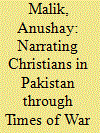

|
|
|
|
|
| Summary/Abstract |
The discussion of Christians in Pakistan usually starts off with them being viewed as a besieged minority without agency which was marginalised further as Pakistan became more ‘Islamic’ through official legislation, particularly under the regime of General Zia ul-Haq in the 1980s. This article attempts to historicise this narrative by focusing on the 1950s and 1960s. It argues that in the early years of Pakistan’s existence, Christians narrated themselves as being important for the very formation of Pakistan and believed that a more equal citizenship was possible, but the environment of political repression under General Ayub Khan, and the war with India in 1965, quickly closed off such possibilities.
|
|
|
|
|
|
|
|
|
|
|
|
|
|
|
|
| 6 |
ID:
170474
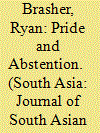

|
|
|
|
|
| Summary/Abstract |
Little research has been done on political dynamics within the Christian community in Pakistan itself, a lacuna I begin to address through survey research among Christian and Muslim students in Lahore. I ground this study in a detailed discussion of the existing literature on Pakistan, and comparative political research on national attachment of minorities elsewhere. I am particularly interested in assessing to what extent Christian students in Lahore have a strong sense of belonging and connection to the national community or feel marginalised from it. In fact, I find that Christians do have a strong sense of connection to their Pakistani identity, but are more inclined toward military rule and less interested in and knowledgeable about politics than their Muslim counterparts. Intra-Christian differences based on income level and denomination are apparent as well: Christian students from wealthier backgrounds have higher levels of political interest and knowledge, whereas poorer students and those affiliated with Pentecostal denominations have less political engagement but higher levels of nationalism.
|
|
|
|
|
|
|
|
|
|
|
|
|
|
|
|
| 7 |
ID:
170471
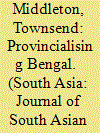

|
|
|
|
|
| Summary/Abstract |
Written against the backdrop of Darjeeling’s 2017 Gorkhaland agitation, this essay chronicles the colonialisations—first British, now Bengali—that undergird this subnationalist struggle. The analysis challenges romanticised views of Darjeeling, presenting instead a case study of internal colonialism. As an exercise in post-colonial thought, it leverages the view from Darjeeling to explore a notable lacuna in our reckonings of subalternity. A place long thought to be ‘above it all’ here begs its own history from below. Heeding Gorkhaland’s call, the essay proposes ‘provincialising Bengal’ as a means to productively address the internal colonialism at hand, and therein rethink Bengal and its peripheries.
|
|
|
|
|
|
|
|
|
|
|
|
|
|
|
|
| 8 |
ID:
170475
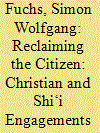

|
|
|
|
|
| Summary/Abstract |
At first glance, Christians and Shi‘is occupy starkly differing socio-economic and religious positions in Pakistani society. Yet, this article argues that both communities share some remarkable similarities in their engagement with the seemingly hostile Pakistani state. Both Christians and Shi‘is have not given up on claiming their stakes as full citizens of the nation despite repeated attempts by parts of the majority population to ostracise and exclude them. I show how they continue to re-read the early history of Pakistan, attempt to prove their unwavering loyalty to the state, try to build bridges with the majority community and, finally, portray themselves as being a spiritual elite that still guarantees the initial promise of Pakistan.
|
|
|
|
|
|
|
|
|
|
|
|
|
|
|
|
| 9 |
ID:
170472
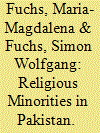

|
|
|
|
|
| Summary/Abstract |
This introduction to the special section of South Asia: Journal of South Asian Studies, titled ‘Religious Minorities in Pakistan’, reviews the existing scholarship on this topic, points out gaps in the research, and discusses problematic notions and assumptions in both popular and academic discourses on minorities. Furthermore, it attempts a definition of the term ‘religious minority’, demonstrates its extensive entanglement with the question of caste—a characteristic specific to the South Asian case—and situates this discourse within broader debates about post-colonial state-building, the history of sectarianism in the region, contestations over religious authority, and the striving for a coherent political and cultural identity in Pakistan, the second-largest Muslim nation in the world.
|
|
|
|
|
|
|
|
|
|
|
|
|
|
|
|
|
|
|
|
|